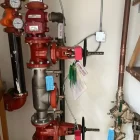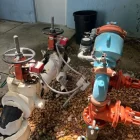frequently asked questions
All the water pipes entering your home, the restaurant down the street, and your local hospital, are all connected to the same water supply. In your residence or business, any mechanically controlled use of water (ie: lawn irrigation, fire sprinkler system, pop machines, pedicure bowls, etc.) requires a backflow preventer as a necessary accessory to your plumbing system. A “backflow preventer” is just what it sounds like. Once water pressure drops, the backflow preventer seals shut, not allowing any water to flow backwards in the wrong direction. The EPA mandates that all backflow preventers be tested and certified once, sometimes twice per year, depending on the geographical location of the backflow preventer. If a water customer chooses not to meet this requirement, that customer will eventually be faced with the termination of their water service until they are able to show proof that their device has been properly tested and maintained. This annual or semi-annual testing is what ensures the safety of your drinking water.
Simply put, backflow occurs when a loss in water pressure (commonly due to a fire hydrant being opened, a water main break or simply abnormally high-water usage) causes the water in your pipes to flow in the opposite direction. This occurrence could allow contaminated or polluted water to travel back into your drinking water.
A Certified Tester is a person who has completed a specialized training course in backflow prevention assembly testing and has passed a proficiency test to prove his/her knowledge. A license upon completion of a passing course is issued to the person by the State of Louisiana.
Absolutely, we provide a copy of the report which will be sent to you at the conclusion of the backflow inspection.
We contract with licensed BPA plumbing specialists to support our customers with high-quality repair and replacement.
The Louisiana Department of Health and Hospitals (DHH) treats noncompliance as a “finding” during sanitary survey audits. As such, the penalty may be up to $3,000.00 per day for noncompliance.



